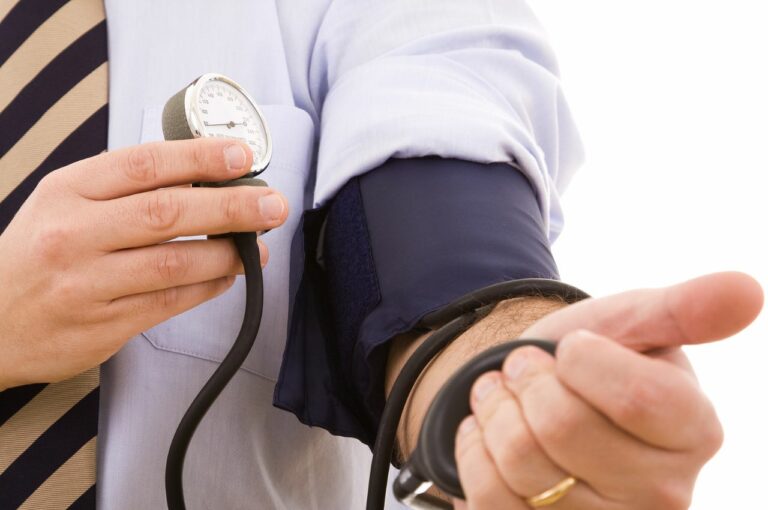Monitoring high blood pressure and eye health can warn you of possible health concerns. Blood pressure is one of the most important health indicators, and untreated high blood pressure can lead to many different medical conditions throughout the body, including deadly strokes and heart attacks. By taking care of your eyes, you’ll be able to catch high blood pressure eye symptoms early and decrease your risk of other health issues.
The link between blood pressure and vision problems
Most people don’t think about their eyes when it comes to their blood pressure, but there are actually several indicators of hypertension (another term for high blood pressure) that medical professionals can detect during an eye exam.
High blood pressure and red eyes often occur simultaneously. The eyes are full of blood vessels, and they typically stiffen and join each other in instances of high blood pressure. Severe cases can lead to blood leakage and busted blood vessels, which can have many dangerous effects on the vision.
High Blood Pressure Eye Symptoms
High blood pressure can have a range of symptoms, some of which may impact the eyes. One common symptom is hypertensive retinopathy, a condition that can cause changes in the blood vessels in the retina.
This can lead to symptoms such as blurred vision, double vision, and even vision loss in severe cases. In addition to retinopathy, high blood pressure can also cause other eye problems such as optic nerve damage, eye hemorrhages, and fluid buildup in the macula.
Detecting high blood pressure early is vital
Maintaining a healthy blood pressure level is one of the best things you can do to safeguard your long-term health, for your eyes and many other vital organs throughout your body. In addition to vision problems such as loss of sight due to blood vessel damage or fluid buildup, chronic high blood pressure effects on eyes can include serious impacts on your heart health.
If left untreated, high blood pressure often leads to serious complications that don’t allow your vital organs to supply blood to the rest of your body — such as strokes or heart attacks.
Can high blood pressure cause flashing lights in eyes?
One lesser-known symptom of high blood pressure is the occurrence of flashing lights in the eyes, also called “floaters.” These small specks or spots appear to float across your field of vision and can be a sign that the condition is affecting the blood vessels in your eyes. If you experience any unusual visual symptoms, it’s important to consult your doctor to rule out any serious underlying conditions.
Staying on top of your eye health and your heart health
Thankfully, most cases of high blood pressure can be treated by a variety of methods that vary from changes in diet and exercise to medication, depending upon the patient. Early detection is crucial to ensure that eye pressure and high blood pressure can be managed before you are at increased risk for the most serious complications.
Undergoing regular eye exams with your eye doctor is not only important for your long-term eye health, but it’s also one of the best things you can do to mitigate risk factors and prevent heart disease.
Contact Florida Eye Specialists today to schedule an appointment at one of our seven locations serving the Jacksonville area. Our ophthalmologists will examine your eyes for signs of hypertension and help you discover if you need to seek treatment for high blood pressure.
What is Hypertensive Retinopathy?
When blood pressure increases, the retina’s blood vessel wall begins to thicken. This can cause blood vessels to narrow and discourage blood flow to the retina. In some cases, the retina can become swollen.
If this goes untreated, high blood pressure can lead to damaged blood vessels in your eyes, limit your eyes’ function and put unwanted pressure on the delicate optic nerve. This results in a condition called Hypertensive Retinopathy (HR).
Symptoms
HR will sneak up on you and you probably won’t experience symptoms until it has progressed to a dangerous level. Possible signs of HR include:
- Loss of vision
- Swollen eyes
- Bursting blood vessels in eyes
- Double vision
- Headaches
How to Avoid Hypertensive Retinopathy
HR happens when blood levels are significantly high over an extended period of time. However, there are steps you can take that limit your chances of getting high pressure.
- Stay physically active
- Avoid salty foods
- Remember to destress
- Live a healthy lifestyle physically and mentally!
You could also be at risk if you have a family history of high blood pressure.
The best course of action to take in order to avoid Hypertensive Retinopathy is to pair your healthy lifestyle with regular visits to your eye doctor. Stay ahead of the game on any issues, and your chances of developing any dangerous conditions will be limited.
*This post was originally published on February 13, 2019, updated on September 29, 2020 to include “What is Hypertensive Retinopathy?” and updated in May 2023 to include “Can High Blood Pressure Cause Flashing Lights in Eyes?” and “High Blood Pressure Eye Symptoms.”
